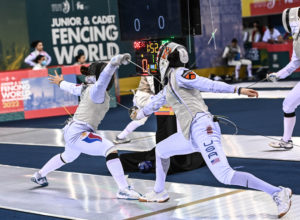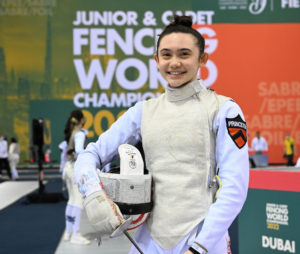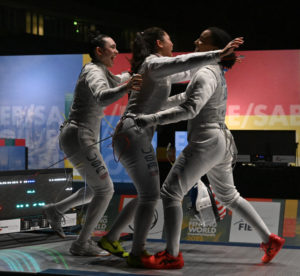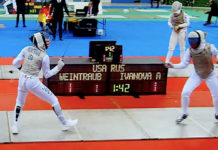
Maia Weintraub competes at the 2022 World Cadets and Juniors Fencing Championships in Dubai in April. | Courtesy of BizziTeam and USA Fencing
Maia Mei Weintraub hardly has any fencing foibles with her foil.
The 19-year-old from Philadelphia won gold on April 7 in Junior Team Women’s Foil at the 2022 World Cadets and Juniors Fencing Championships in Dubai.
A first-year student at Princeton University, Weintraub represented the U.S. along with teammates Rachael Kim, Zander Rhodes and Lauren Scruggs, all of whom competed in the Junior championship for competitors under 20.
The event hosted by the International Fencing Federation featured more than 30 countries, including Israel, Ukraine and Singapore. There were 148 fencers in the individual competition and 32 teams.
The Junior U.S. team faced its greatest challenges against adversaries Italy and Japan, and Weintraub maintained her team’s lead throughout the tournament.
Though a team sport, each fencing bout is an individual event, with a fencer from one team going head-to-head with another, trying to score up to five points, or touches, within the three-minute round. Each team tries to score a cumulative total of 45 points, with each fencer picking up where the other left off.
In between scoring touches, Weintraub was concerned with another important tally: her GPA. The fencer continued to attend classes virtually and complete midterm exams during the tournament, pursuing her interests in ecology and biology.

“It’s not easy being a student-athlete at an Ivy League school,” said Weintraub’s father Jason Weintraub. “As you can imagine, the majority of her professors don’t care that she’s traveling around the world representing the U.S. and Princeton. They’re more interested in her own academic obligations.”
Not even finished with her second decade of life, Weintraub has achieved fencing renown, serving as the first alternate in the 2020 Tokyo Olympics. In March, Weintraub won the NCAA individual weapon championship in her debut, becoming the sixth Princeton student to win an individual championship and the second to win a foil championship. The month before, she won the Ivy League individual championship. She also competed in the 2019 European Maccabi Games.
In addition to competing at the college level, Weintraub is eying a spot on Team USA for the 2024 Paris Olympics.
“Fencing is very unique. I feel like it’s not one of those sports where you can just pick up a foil or weapon and just start,” Weintraub said in a December 2020 Jewish Exponent interview. “You have to dedicate yourself to learning the art of fencing before you can actually do it. And I think that dedicating that time and choosing to do it makes it special.”
Weintraub began fencing at 9, taking a beginner’s fencing class at the Fencing Academy of Philadelphia with Maître d’Armes (master of arms) Mark Masters.
Weintraub’s uncles — who themselves grew up fencing in their hometown of Detroit — fostered Weintraub’s interest in the sport. They had trained under the same mentor as Masters and made the initial connection between the two.
Though Masters had trained three world champions in the past, his training was only able to take Weintraub so far, as the Philadelphia fencing scene remained less competitive than its poles on the East and West Coasts in New York and California.
Without strong competition, Weintraub’s progress would plateau.
“With fencing, to be able to practice the sport, you need to be with other people, and you need to fence against other people — that’s how you get better,” she said in 2020.
In high school, her parents made the leap to allow Weintraub to travel by bus to the Manhattan Fencers Club, a haven for up-and-coming fencers. In addition to physical endurance training twice a week, Weintraub sometimes traveled to Manhattan three times a week after school, completing homework on her bus commutes.

In middle school, Weintraub was interested in playing the violin, and her family was involved at Folkshul Philadelphia to provide Weintraub with a cultural Jewish foundation. When fencing became a serious pursuit, her parents pivoted.
“We recognized pretty quickly that she has a real love for the sport. We wanted to fuel her passion in something because that’s important to us,” Jason Weintraub said.
Masters recognized the passion as well. In the game of “physical chess,” a fencer’s mind has to be as sharp as their movements. Though Masters treats all his young students the same, he often senses potential in some early on in their ability to handle the pressure of an intense 3-minute bout.
Weintraub was a “money player,” according to Masters, someone he could bet on to perform at the highest level.
“The other person who may be doing fine before — suddenly there’s more at stake. They get anxious, they get nervous, and they make more mistakes,” Masters said. “A money player is somebody who, when the stakes are higher, will perform better. That’s an important characteristic, really, of every top-level athlete.”




